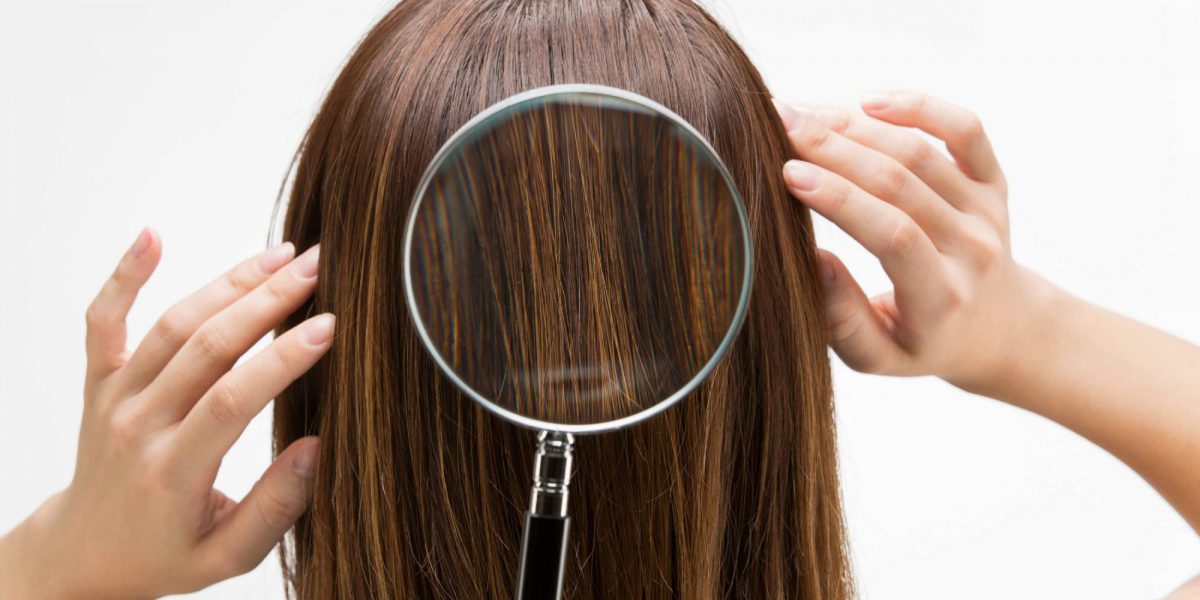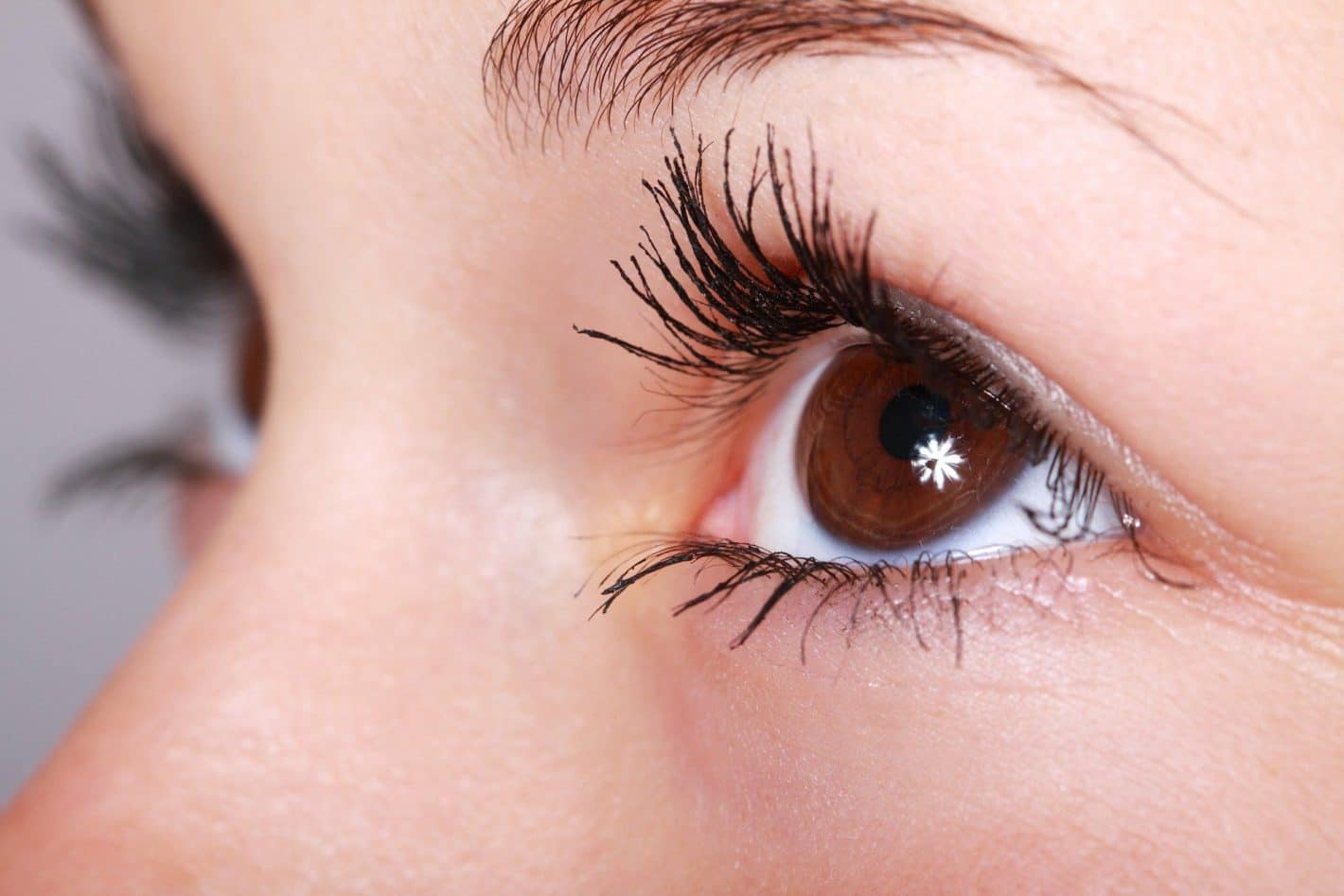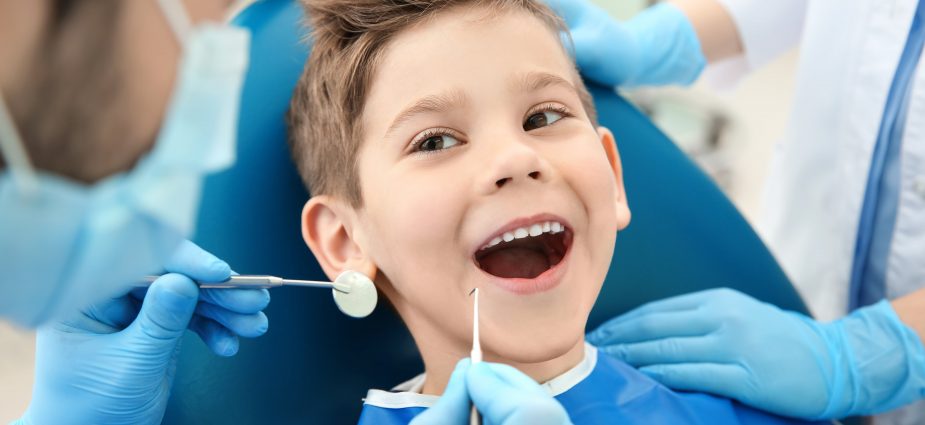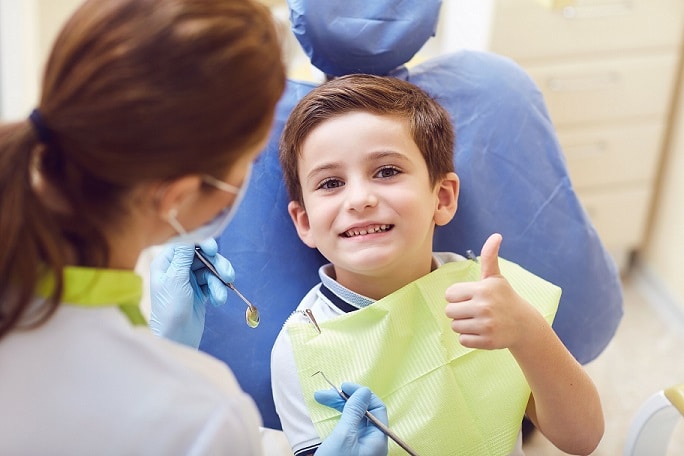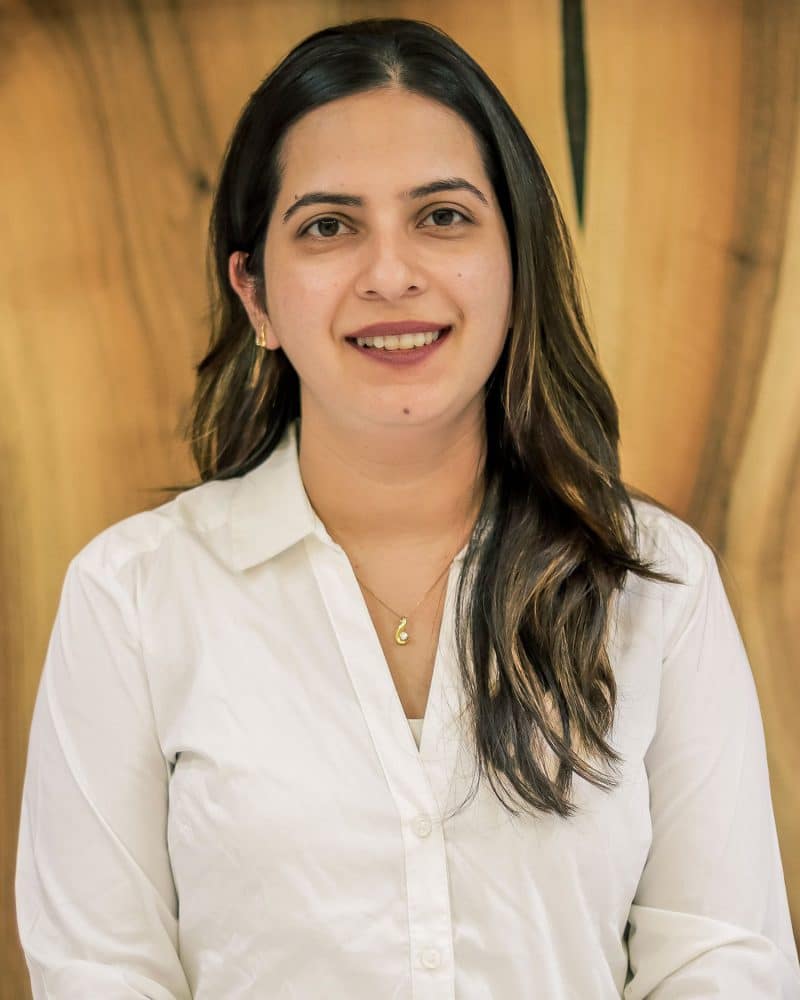Much of Pediatric dentistry involves treating dental problems in children and young adults. It’s a field of dentistry that includes diagnosis, prevention, and treatment for diseases, injuries, and defects in teeth and jaws of children and young adults, including those with special health care needs.
General anesthesia in pediatric dentistry is a commonly used practice for dental treatment of fearful and anxious children, those with medical compromises, and other special health care needs. General anesthesia is basically a type of medication that puts the child into a deep sleep. And allows the dentist to complete the treatment safely and effectively.
It might be scary to hear that your child needs to be put under general anesthesia during a dental procedure. This blog is written to answer the most commonly asked doubts about the procedure, that you may have about general anesthesia and pediatric dentistry.
What is General Anesthesia and why does my child need it?
General anesthesia is a form of pharmacologic behavior management technique in which a child is put into deep sleep during the appointment. It allows the dentist to complete dental treatments safely and effectively. Sometimes, general anesthesia is necessary when It is most commonly used in treating children who need extensive dental treatments, and are anxious, too young to cooperate, and fearful in a dental setting. It is also used for the safe delivery of dental treatment in children and adults with severe physical or mental handicaps, intellectual disability, or behavioral and communication deficits. Extensive dental treatments may include several teeth to be treated at the same time, including multiple root canals, crowns, teeth extraction(removal), placement of dental implants, multiple teeth fillings, etc.
Is General Anesthesia Safe?
Like any other form of anesthesia, General anesthesia use in dentistry comes with its own set of risks and complications. In a well-equipped setup and a well-trained anesthesia team, these complications and risks can be minimized. A detailed evaluation and examination are done prior to the procedure.
When Should General Anesthesia Be Administered?
At Pandit Clinic, Kids Dentist Dr. Pratibha Kukreja Pandit considers general anesthesia as a treatment modality if the child falls into one of the following categories:
- An extremely uncooperative, afraid, or anxious child.
- A child needing extensive dental treatment, who is too young to comprehend instructions and cooperate.
- A special needs child who is unable to understand the dentistinstructions given by the
- An individual who needs complex dental procedures or surgeries like multiple dental extractions or wisdom tooth removal or dental cyst removal.
When Is General Anesthesia Recommended For Pediatric Dentistry Treatments?
How Will General Anesthesia Be Administered?
The anesthesiologist determines which method is best for giving anesthesia to your child. The most general way to administer general anesthesia is by giving it through an IV. To numb the pain from an injection, a numbing cream is rubbed on the child’s arm. The doctor will decide which method is the best way to administer general anesthesia to the child.
There are also other methods of giving general anesthesia such as by mouth or by the nose, depending on the need.
What Happens Before The Administration Of General Anesthesia?
- Evaluation: Before the procedure, it is mandatory to undergo a consultation with the dentist. Depending upon the clinical situation and relevant dental xrays , the dentist decided on the course of treatment. The pre anesthesia evaluation is done in conjunction with laboratory reports by Pandit Clinic’s anesthesiologist. Our doctors will take into account the medical history of the patients before prescribing the appropriate investigations required for the procedures. A physical examination is performed to ensure safety during dental treatment or surgery. A general physician or pediatrician might be asked to provide consent about the overall health of the patient. If necessary, additional evaluation by a specialist may be required.
- Food And Fluid Restrictions: The child's stomach should be empty when general anesthesia is administered. Prior to your child's anesthesia, specific, age appropriate instructions regarding feeding are provided by the clinic staff at Pandit Clinic.
What Will Happen After The Dental Procedure?
Your child will be discharged when they have regained consciousness and are alert. After the procedure, children often feel tired and drowsy for a few hours. Your child will be advised to stay at home for the next 24 hours with minimal activity. Postoperative antibiotics and painkillers will be prescribed as required. Postoperative dietary recommendations for your child will also be provided.
A happy and relaxed environment is the most effective way for your child to recover from a procedure under general anesthesia safely and comfortably.
Are Parents Welcome To Stay When The General Anesthesia Is Given?
Considering few circumstances, parents are allowed to stay with their children just at the start of the procedure. This allows them to feel more comfortable and relaxed. Following the initiation of the procedure, parents aren’t allowed inside of the operating room.
What Are The Potential Side Effects Of General Anesthesia?
The potential side effects of general anesthesia include:
- Drowsiness
- Dizziness
- Nausea
- Vomiting
However, these side effects are rare and are usually mild. Feel free to discuss your concerns with our doctors at the consultation visit. It is important to note here that Pediatric Dentist Dr. Pratibha Kukreja Pandit does not recommend treatments under general anesthesia unless and until it is necessary.
At Pandit Clinic, Pune we take safety seriously and do our best to ensure that your child’s dental procedures are completed without any complications. We use general anesthesia only when necessary and always follow the latest safety protocols. We want to make sure that your child is safe and comfortable during their visit. If you have any questions or concerns, please don’t hesitate to contact us on +918805980048 or book an appointment with Dr. Pratibha Kukreja Pandit.
Virtual Video Consultations
100% SAFE AND SECURE CALLS WITH ENCRYPTION. YOUR PRIVACY AND CONFIDENTIALITY IS GUARANTEED.
Start here, by making an appointment for a virtual consultation with our expert Dr. Pratibha Kukreja Pandit (NEW PATIENTS ONLY).
Dr. Pratibha Kukreja Pandit is available for Virtual Video Consultations from Monday – Saturday between the hours of 11 am – 2pm and 4pm – 7pm.
If you are already our valued patient with questions or have an emergency please contact the clinic on +91 9822053446
Consult Dr. Pratibha Kukreja Pandit
(Pediatric Dentist)
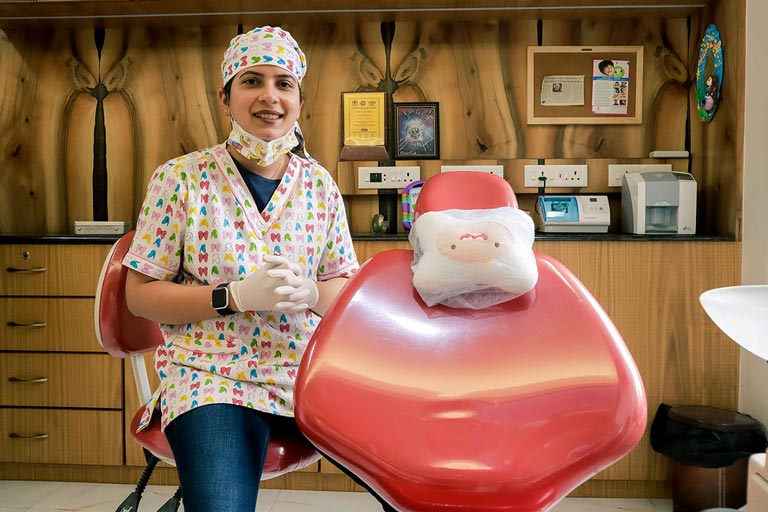
Virtual Video Consultation Fees Rs. 500
The Consultation Fees Must Be Paid Online by GOOGLE PAY BEFORE YOUR APPOINTMENT. See The Instructions On Appointment Confirmations
Your virtual video consultation includes:
- Discussion of problems that your child is facing like tooth pain, swelling or any other emergencies
- Dr. Pratibha will recommend a course of treatment or medications for your child.
Meet the Doctor
Pediatric and Preventive Dentistry Specialist
Dr. Pratibha is the Chief Dentist at Pandit Clinic. She is also a Consultant Pediatric Dentist at Kotbagi Hospital and KEM Hospital, Pune.
Dr. Pratibha has trained at the prestigious Chang Gung Memorial Hospital, Taiwan, in advanced areas including Pediatric dental treatment under General Anesthesia and Intravenous sedation, Dental Rehabilitation of children with special health care needs, and Nasoalveolar molding and dental rehabilitation of cleft lip and cleft palate.
She’s the lifetime member of Student Clinician Association, American Dental Association (SCADA), USA.
Professional Affiliations and Skills
- Trained in Pediatric dental treatment under General Anesthesia and Intravenous sedation at Chang Gung Memorial Hospital, Taiwan
- Trained in Dental Rehabilitation of children with special health care needs at CGMH, Taiwan
- Trained in Nasoalveolar molding and dental rehabilitation of Cleft lip and Cleft Palate at craniofacial centre, CGMH, Taiwan
- Awarded Lifetime membership, SCADA (Student Clinician Association, American Dental Association), USA.
You Might Be Interested In
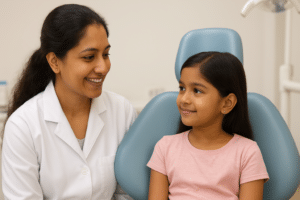
Why Every Deep Cavity in Children Doesn’t Mean a Root Canal
Let’s face it—just hearing the words “root canal” makes most adults wince. Now imagine being a parent, hearing that your little one has a deep
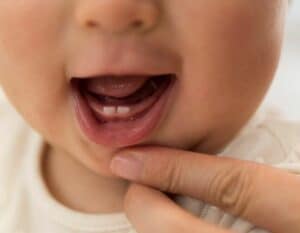
What To Do If Your Baby Has Natal Or Neonatal Teeth
A new parent definitely knows when the little one will start ‘teething’! While for some babies this process is relatively easy, others find it to



